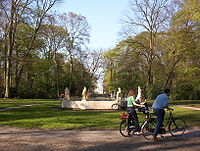Nicolaas Beets
Nicolas Beets | |
|---|---|
 | |
| Born | September 13, 1814 Haarlem, the Netherlands |
| Died | March 13, 1903 (aged 88) Utrecht, the Netherlands |
| Pen name | Hildebrand |
| Occupation | Protestant minister |
| Nationality | Netherlands |
| Subject | Short autobiographical stories |
| Notable works | Camera Obscura |
Nicolaas Beets (13 September 1814 – 13 March 1903) was a Dutch theologian, writer and poet. He published under the pseudonym, Hildebrand.
Life
Nicolaas Beets was born in Haarlem, the son of a pharmacist. From 1833 till 1839 he studied theology at the university of Leiden where he received his doctorate.
In 1840 he became a minister at the Dutch Reformed Church in Heemstede. In the same year he married Aleida van Foreest. In 1848 he became correspondent of the Royal Institute of the Netherlands, when that became the Royal Netherlands Academy of Arts and Sciences in 1851 he joined as member.[1] In 1854 he moved to Utrecht where from 1874 till 1884 he was a professor in church history at the University of Utrecht.
He wrote prose, poetry and sermons. As a poet, Beets came under the influence of Byronism.[2]
His most famous work is Camera Obscura, which he wrote under his pseudonym during his student years.[2] Of his poems, "De moerbeitoppen ruischten" is well-known and popular;[3][4] it is heavily anthologized, and even called "immortal" by one critic.[5]
Beets died of a brain haemorrhage at age 88, in Utrecht.

References
- ^ "Nicolaas Beets (1814 - 1903)". Royal Netherlands Academy of Arts and Sciences. Retrieved 20 July 2015.
- ^ a b Chisholm 1911.
- ^ Hellman, Noor (22 November 2015). "Joost Prinsen: 'Mijn tranen zitten losser dan vroeger'". Trouw. Retrieved 18 May 2016.
- ^ "De moerbeiboom". Friesch Dagblad. 19 February 2011. Retrieved 18 May 2016.
- ^ Schutter, Freddy de (2000). Het verhaal van de Nederlandse literatuur: Verlichting. Romantiek. Realisme-naturalisme. Multatuli en Gezelle. DNB/Pelckmans. p. 161. ISBN 9789028416826. Retrieved 18 May 2016.
- Attribution
- Chisholm, Hugh, ed. (1911). . Encyclopædia Britannica. Vol. 3 (11th ed.). Cambridge University Press.
- This article incorporates text from a publication now in the public domain: Wood, James, ed. (1907). The Nuttall Encyclopædia. London and New York: Frederick Warne.
{{cite encyclopedia}}: Missing or empty|title=(help)
External links
- Works by Nicolaas Beets at Project Gutenberg
- Works by or about Nicolaas Beets at the Internet Archive
- Works by or about Hildebrand at the Internet Archive
- Works by Nicolaas Beets at LibriVox (public domain audiobooks)

- 1814 births
- 1903 deaths
- Male novelists
- Dutch male writers
- Dutch male poets
- Dutch Calvinist and Reformed theologians
- 19th-century Calvinist and Reformed theologians
- People from Haarlem
- Leiden University alumni
- Utrecht University faculty
- Commanders of the Order of the Netherlands Lion
- Members of the Royal Netherlands Academy of Arts and Sciences
- 19th-century poets
- 19th-century Dutch novelists
- 19th-century male writers
- Dutch people stubs
